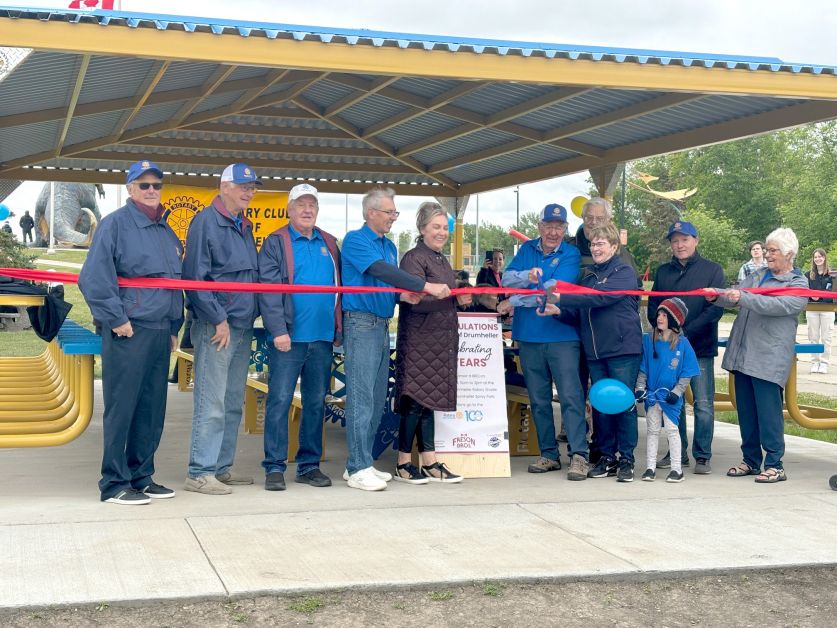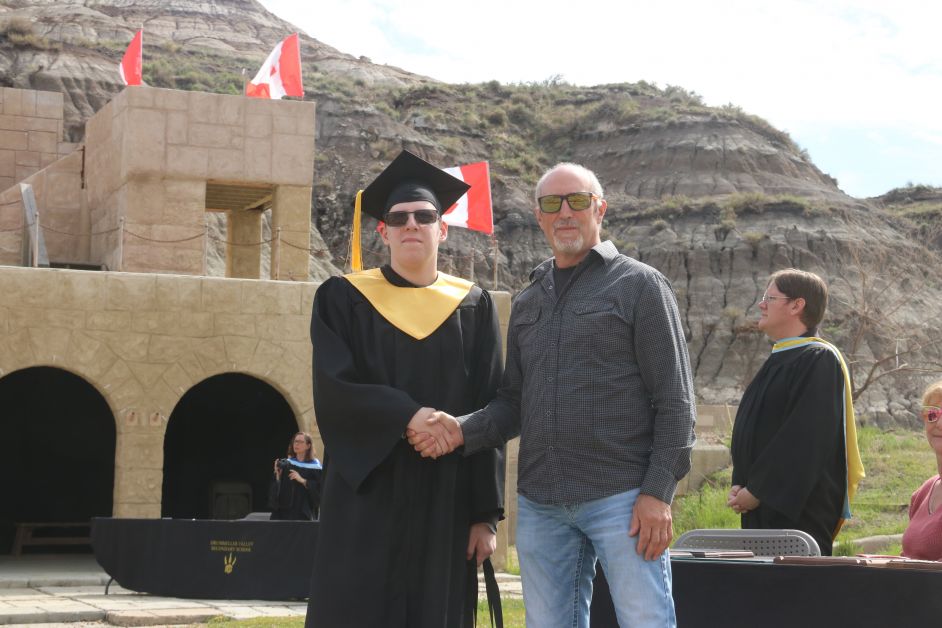
Lucas Anderson plans to take a gap year before enrolling at Olds College. He was awarded the Ken Morrow Family Graduation Sponsorship, presented by Ken Morrow.


 Olivia Anderson plans to work next year before studying film production and history through SAIT and the University of Calgary to pursue a career in the film industry. She was awarded the English 30-1, sponsored by Western GM Drumheller and presented by Doug Lubinski; the Music 30 (Choral) award sponsored by Richardson Bulk Sales Ltd and presented by Nikki Broom, and the R Neuman Theatre - Musical Award, sponsored by Becky Neuman and presented by Mr. James Foster; the Jacor Marketing Award presented by Shauna Johnson; the Ken Morrow Family Graduation Sponsorship presented by Ms. Melanie Thom. She also received the DVSS Social 30-1, Choir and Senior High Drama & Video Arts Awards.
Olivia Anderson plans to work next year before studying film production and history through SAIT and the University of Calgary to pursue a career in the film industry. She was awarded the English 30-1, sponsored by Western GM Drumheller and presented by Doug Lubinski; the Music 30 (Choral) award sponsored by Richardson Bulk Sales Ltd and presented by Nikki Broom, and the R Neuman Theatre - Musical Award, sponsored by Becky Neuman and presented by Mr. James Foster; the Jacor Marketing Award presented by Shauna Johnson; the Ken Morrow Family Graduation Sponsorship presented by Ms. Melanie Thom. She also received the DVSS Social 30-1, Choir and Senior High Drama & Video Arts Awards.
 Avery Archer plans to work and pursue a career in the trades. He received the Boston Pizza Award presented by Heather Jones, and the DVSS Foods Award.
Avery Archer plans to work and pursue a career in the trades. He received the Boston Pizza Award presented by Heather Jones, and the DVSS Foods Award.
 Harper Bell plans to study kinesiology at Red Deer Polytechnic. She was presented the Sam’s Truck and Car Wash award by Jake Stadlweiser.
Harper Bell plans to study kinesiology at Red Deer Polytechnic. She was presented the Sam’s Truck and Car Wash award by Jake Stadlweiser.

 Vladyslav Boialskyi (Vlad) plans to become a firefighter while taking online post-secondary courses in nursing. He was presented the Boston Pizza Award by Heather Jones and the Drumheller Hospital Auxiliary Society Award by Mr. Jason Rasmussen.
Vladyslav Boialskyi (Vlad) plans to become a firefighter while taking online post-secondary courses in nursing. He was presented the Boston Pizza Award by Heather Jones and the Drumheller Hospital Auxiliary Society Award by Mr. Jason Rasmussen.
 Georgia Buchberger plans to travel next year before attending university to study sciences and play softball. She was awarded the Co-operators ProPlan Financial Group Community Involvement Scholarship by Kayla Clark.
Georgia Buchberger plans to travel next year before attending university to study sciences and play softball. She was awarded the Co-operators ProPlan Financial Group Community Involvement Scholarship by Kayla Clark.
 Gavan Cassidy plans to work and travel before pursuing a career in athletic therapy. He was presented the Raze Sports Humanitarian Award presented by Ritch A. Winter.
Gavan Cassidy plans to work and travel before pursuing a career in athletic therapy. He was presented the Raze Sports Humanitarian Award presented by Ritch A. Winter.
 Kerric Chambers plans to work on the family farm as well as pursue his hockey career. He received the DVSS Construction Award.
Kerric Chambers plans to work on the family farm as well as pursue his hockey career. He received the DVSS Construction Award.

 Yongin Cho (Eric) plans to pursue a Bachelor of Health and Physical Education at Mount Royal University with the goal of becoming a Physical Therapist. He was awarded the DeBona-Brown Award, sponsored by Sam Brown, by Wendy Olson and the DVSS International Award, presented by Koren McDougald.
Yongin Cho (Eric) plans to pursue a Bachelor of Health and Physical Education at Mount Royal University with the goal of becoming a Physical Therapist. He was awarded the DeBona-Brown Award, sponsored by Sam Brown, by Wendy Olson and the DVSS International Award, presented by Koren McDougald.
 Yoongyoon Cho (Yoon) plans to study business at Seneca College to become a fund manager. He was presented the DVSS International Award sponsored by Friends of DVSS by Koren McDougald, and the DVSS Physical Education Award.
Yoongyoon Cho (Yoon) plans to study business at Seneca College to become a fund manager. He was presented the DVSS International Award sponsored by Friends of DVSS by Koren McDougald, and the DVSS Physical Education Award.
 Darious Crowe aims to do work in the lumber industry in British Columbia. He received the Most Improved Student Award, sponsored by Westview Co-op presented by Janel Berg.
Darious Crowe aims to do work in the lumber industry in British Columbia. He received the Most Improved Student Award, sponsored by Westview Co-op presented by Janel Berg.

Kalaya Dutton intends to study for a degree in Agribusiness from the University of Saskatchewan. She received the Business Leaders of Tomorrow Scholarship, sponsored by The Drumheller & District Chamber of Commerce, presented by Shelley Rymal.
 Luke Elliott plans to begin his career by launching a YouTube or Twitch channel. He received the English 30-2, sponsored by: Mr. & Mrs. Clint & Lynn Hemming, presented by Janel Berg and the DVSS English 30-2 Award.
Luke Elliott plans to begin his career by launching a YouTube or Twitch channel. He received the English 30-2, sponsored by: Mr. & Mrs. Clint & Lynn Hemming, presented by Janel Berg and the DVSS English 30-2 Award.

Brian Foley plans to take a year off and then consider pursuing a career in mechanics. He received the DVSS Career & Technology Studies Award, sponsored by Friends of DVSS by Koren McDougald and the DVSS Welding Award.
 Brendan Frizzell will study a Bachelor of Psychology at Mount Royal University and intends to pursue a law degree to become an attorney. He received the Barry & James LLP Barristers & Solicitors Award, presented by Mitchell Barry and Michael James.
Brendan Frizzell will study a Bachelor of Psychology at Mount Royal University and intends to pursue a law degree to become an attorney. He received the Barry & James LLP Barristers & Solicitors Award, presented by Mitchell Barry and Michael James.
 Ashley Gerlinger will work before pursuing a chemical and biological sciences program at the post-secondary level. He received the East Coulee Student Award, presented by Shelley Bachman.
Ashley Gerlinger will work before pursuing a chemical and biological sciences program at the post-secondary level. He received the East Coulee Student Award, presented by Shelley Bachman.
 Erine Gomez will study psychology at the University of Alberta with the goal of pursuing a career in health sciences. He received the Riverside Dental Health Care Scholarship, presented by Ken Poznikoff.
Erine Gomez will study psychology at the University of Alberta with the goal of pursuing a career in health sciences. He received the Riverside Dental Health Care Scholarship, presented by Ken Poznikoff.
 Grace Graff will enroll in the Service Dog Training and Canine Studies program at Medicine Hat College. She received the Foods 30 Award, sponsored by Yavis Family Restaurant, presented by Mr. Matt Lauridsen and the DVSS Foods Award.
Grace Graff will enroll in the Service Dog Training and Canine Studies program at Medicine Hat College. She received the Foods 30 Award, sponsored by Yavis Family Restaurant, presented by Mr. Matt Lauridsen and the DVSS Foods Award.
 Ethan Greene plans to work toward a career as an automotive service technician. He received the Peterson Auto Body RAP Bursary, presented by Curtis LaPierre.
Ethan Greene plans to work toward a career as an automotive service technician. He received the Peterson Auto Body RAP Bursary, presented by Curtis LaPierre.


 Ava Groves plans to take a year to work and travel before pursuing a career in STEM. She received the Biology 30 Award, sponsored by Drumheller Associated Physicians, the A.M.R. Dance Award, presented by Christine Burfield; and the Greentree Dental Academic Award, presented by Dr. Charles Kim.
Ava Groves plans to take a year to work and travel before pursuing a career in STEM. She received the Biology 30 Award, sponsored by Drumheller Associated Physicians, the A.M.R. Dance Award, presented by Christine Burfield; and the Greentree Dental Academic Award, presented by Dr. Charles Kim.


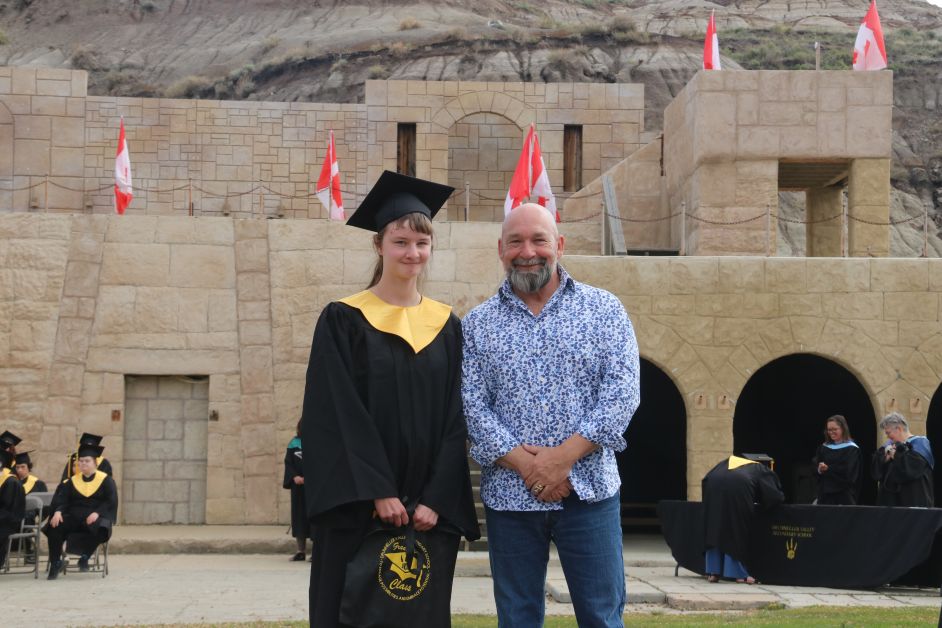 Abigail Halliday will study at Capernwray Hall in England and plans to train service dogs professionally. She was awarded the Music 30 (Choral) Award, sponsored by Richardson Bulk Sales Ltd. and presented by Nikki Broom; the Drama 30 Award, sponsored by Western GM Drumheller and presented by Doug Lubinski; the Kaleidoscope Community Theatre Scholarship presented by Ashely Turner and the DVSS Choir & Senior High Drama Award.
Abigail Halliday will study at Capernwray Hall in England and plans to train service dogs professionally. She was awarded the Music 30 (Choral) Award, sponsored by Richardson Bulk Sales Ltd. and presented by Nikki Broom; the Drama 30 Award, sponsored by Western GM Drumheller and presented by Doug Lubinski; the Kaleidoscope Community Theatre Scholarship presented by Ashely Turner and the DVSS Choir & Senior High Drama Award.
 Tanner Harvie will begin his welding apprenticeship in Sylvan Lake, with future plans to become a police officer. He was presented the DVSS Spirit Award, sponsored by Century 21 Power Realty and presented by Peter Bjel.
Tanner Harvie will begin his welding apprenticeship in Sylvan Lake, with future plans to become a police officer. He was presented the DVSS Spirit Award, sponsored by Century 21 Power Realty and presented by Peter Bjel.


 Fynlee Hunter will study at the University of Alberta and aims to pursue a career in dental hygiene. She was awarded the Bancroft Student Bursary, sponsored by The Drumheller Rotary Club, presented by Ken Briault; the Freemasons of Drumheller Bursary in Memory of Lorraine M. Hunter, presented by RW Bro Dave Carter and the Riverside Dental Scholarship presented by Dr. Ken Poznikoff.
Fynlee Hunter will study at the University of Alberta and aims to pursue a career in dental hygiene. She was awarded the Bancroft Student Bursary, sponsored by The Drumheller Rotary Club, presented by Ken Briault; the Freemasons of Drumheller Bursary in Memory of Lorraine M. Hunter, presented by RW Bro Dave Carter and the Riverside Dental Scholarship presented by Dr. Ken Poznikoff.


 Nunsawat Jatawattana (Teng) will pursue a Bachelor of Engineering at the University of Alberta. He received the Social Studies 30-1 Award, sponsored by BrokerLink, presented by Jared Potter; the Instrumental Music 30 Award, sponsored by Ron and Helen Leonhardt, presented by Mrs. Lynn Hemming; the International Student Community Involvement Award, sponsored by the 2023 DVSS Grad Class by Robert Metcalfe and the DVSS Physics 30 and Strings Awards.
Nunsawat Jatawattana (Teng) will pursue a Bachelor of Engineering at the University of Alberta. He received the Social Studies 30-1 Award, sponsored by BrokerLink, presented by Jared Potter; the Instrumental Music 30 Award, sponsored by Ron and Helen Leonhardt, presented by Mrs. Lynn Hemming; the International Student Community Involvement Award, sponsored by the 2023 DVSS Grad Class by Robert Metcalfe and the DVSS Physics 30 and Strings Awards.
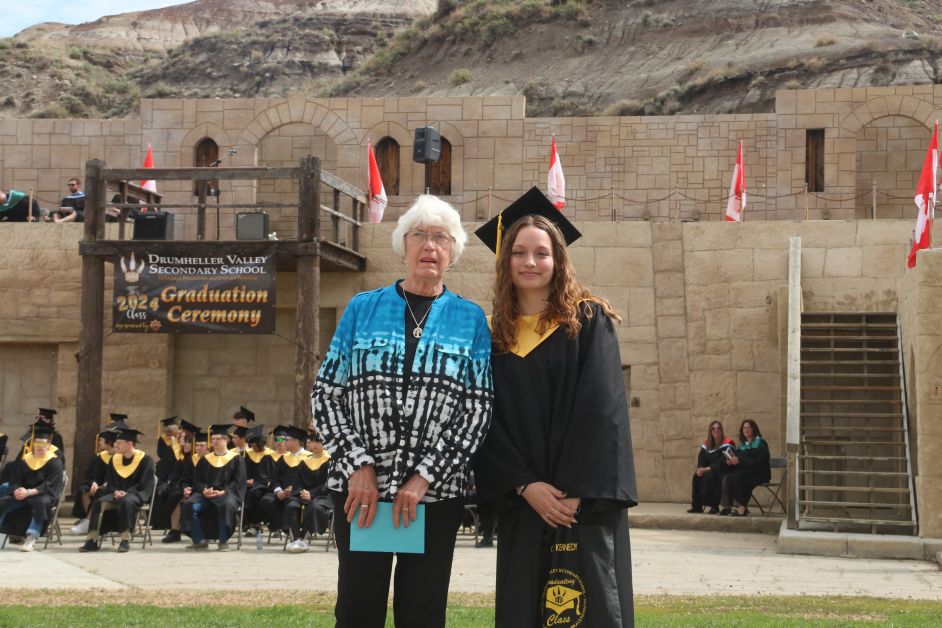 Chloe Kennedy will attend Red Deer Polytechnic to pursue a Bachelor of Science in Biological Sciences. She received the Dr. Boris Nahornick Scholarship, presented by Lynn Zacharuk.
Chloe Kennedy will attend Red Deer Polytechnic to pursue a Bachelor of Science in Biological Sciences. She received the Dr. Boris Nahornick Scholarship, presented by Lynn Zacharuk.


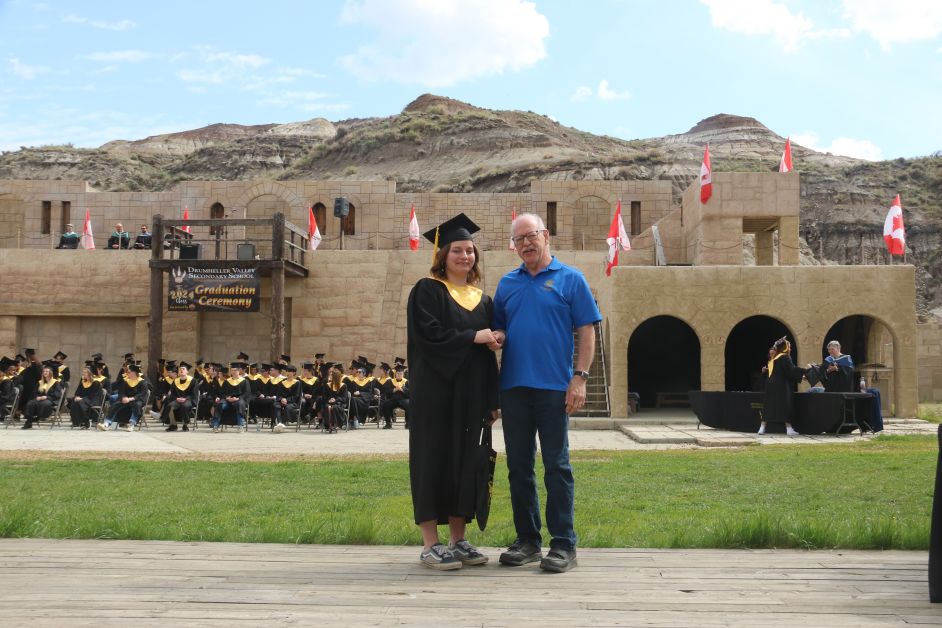 Vianne Kennedy plans to start the Refrigeration Apprenticeship Program at SAIT. She received the Math 30-2, sponsored by CIBC, presented by Pat Giffin, the Mitchell Dawson Memorial Scholarship, sponsored by Lindy Dawson, presented by Shannon Palomaki; the Rotary Trades Scholarship presented by Ken Briault and the DVSS Math 30-2 Award.
Vianne Kennedy plans to start the Refrigeration Apprenticeship Program at SAIT. She received the Math 30-2, sponsored by CIBC, presented by Pat Giffin, the Mitchell Dawson Memorial Scholarship, sponsored by Lindy Dawson, presented by Shannon Palomaki; the Rotary Trades Scholarship presented by Ken Briault and the DVSS Math 30-2 Award.

 Laresa Khamis will study for a Bachelor of Business Administration in Human Resources at Mount Royal University, aspiring to become a head of human resources. She received the Business Leaders of Tomorrow Scholarship, sponsored by The Drumheller & District Chamber of Commerce, presented by Shelley Rymal; the Valley Law Chambers Scholarship, presented by Peter Bjel and the DVSS - Multi Language, Lab Spanish and Mandarin Award.
Laresa Khamis will study for a Bachelor of Business Administration in Human Resources at Mount Royal University, aspiring to become a head of human resources. She received the Business Leaders of Tomorrow Scholarship, sponsored by The Drumheller & District Chamber of Commerce, presented by Shelley Rymal; the Valley Law Chambers Scholarship, presented by Peter Bjel and the DVSS - Multi Language, Lab Spanish and Mandarin Award.

 Aaron Jun-Su Kim will study for a Bachelor of Engineering at the University of Alberta with the aim of becoming an engineer. He was presented the Math 31 Award, sponsored by Hi-Way 9 Express Ltd., presented by Mrs. Crystal Hall; the Royal Tyrrell Museum High Science Award, sponsored by the Royal Tyrrell Museum Cooperating Societyand the DVSS Math 31 Award.
Aaron Jun-Su Kim will study for a Bachelor of Engineering at the University of Alberta with the aim of becoming an engineer. He was presented the Math 31 Award, sponsored by Hi-Way 9 Express Ltd., presented by Mrs. Crystal Hall; the Royal Tyrrell Museum High Science Award, sponsored by the Royal Tyrrell Museum Cooperating Societyand the DVSS Math 31 Award.

Benjamin Law will play for the Calgary Colts football team before pursuing a degree in Kinesiology for a career in physiotherapy or sports medicine. Received the Royal LePage Wildrose Real Estate Community Spirit Award presented by Jannelle Storch.
 Tsz Laam Lee (Karla) will study the Early Childhood Education program at Sheridan College. She received the Three Drums of Wheat Local #20 ATA Teaching Scholarship, presented by Andrew Berdahl.
Tsz Laam Lee (Karla) will study the Early Childhood Education program at Sheridan College. She received the Three Drums of Wheat Local #20 ATA Teaching Scholarship, presented by Andrew Berdahl.

 Evan Manca will enroll in the Bachelor of Engineering program at the University of Alberta. He received the Math 30-1 Award, sponsored by Dan and Shelley Hird, and presented by Dan Hird, and the DVSS Leadership Award, sponsored by the 2023 DVSS Grad Class, presented by Brooklyn Gipman.
Evan Manca will enroll in the Bachelor of Engineering program at the University of Alberta. He received the Math 30-1 Award, sponsored by Dan and Shelley Hird, and presented by Dan Hird, and the DVSS Leadership Award, sponsored by the 2023 DVSS Grad Class, presented by Brooklyn Gipman.

 Terry Martin plans to attend SAIT to study both business and carpentry. He received the Co-operators ProPlan Financial Group Business/Agricultural Scholarship, presented by Kayla Clark, and the Drumheller Minor Hockey Scholarship, presented by Kim Moulton.
Terry Martin plans to attend SAIT to study both business and carpentry. He received the Co-operators ProPlan Financial Group Business/Agricultural Scholarship, presented by Kayla Clark, and the Drumheller Minor Hockey Scholarship, presented by Kim Moulton.


 Grady McGougan plans to pursue a Bachelor of Science at Thompson Rivers University. He was awarded the Drumheller Chiropractic Centre Science Scholarship Award, presented by Matt Sandersen; the Drumheller Family Scholarship, sponsored by the Royal Tyrrell Museum Cooperating Society, presented by Patty Ralrick, and the Three Drums of Wheat Local #20 ATA Teaching Scholarship, presented by Andrew Berdahl.
Grady McGougan plans to pursue a Bachelor of Science at Thompson Rivers University. He was awarded the Drumheller Chiropractic Centre Science Scholarship Award, presented by Matt Sandersen; the Drumheller Family Scholarship, sponsored by the Royal Tyrrell Museum Cooperating Society, presented by Patty Ralrick, and the Three Drums of Wheat Local #20 ATA Teaching Scholarship, presented by Andrew Berdahl.
 Emilio Mendez Gomez will attend Northwestern Polytechnic before transferring to the University of Alberta to complete his Bachelor of Engineering degree. He was awarded the Anderson Drug by Freson Bros. Award, sponsored by Freson Bros., and presented by Dale Goulder.
Emilio Mendez Gomez will attend Northwestern Polytechnic before transferring to the University of Alberta to complete his Bachelor of Engineering degree. He was awarded the Anderson Drug by Freson Bros. Award, sponsored by Freson Bros., and presented by Dale Goulder.

Jayden Ostapowich will enroll in the Animal Health Technology Program at Olds College to become a Veterinary Technician. She was awarded the Raze Sports Humanitarian Award, sponsored and presented by Mr. Ritch A. Winter.
 Thomas Patterson plans to complete graphic design courses and obtain his advanced open-water diver certification to pursue a career as an underwater photographer. He received the Kelley Hamelin Bursary, sponsored by Rusty and Shirley Hamelin, and presented by Cindy Sereda.
Thomas Patterson plans to complete graphic design courses and obtain his advanced open-water diver certification to pursue a career as an underwater photographer. He received the Kelley Hamelin Bursary, sponsored by Rusty and Shirley Hamelin, and presented by Cindy Sereda.

Rio Sakai will attend university to study engineering. She was presented with the Drumheller Lions Memorial Award, presented by Robyn Yaremcio and the DVSS Math 30-1 Award.
 Preston Sieppert will take a year off to work and is planning a career in a trade. He was presented the Sil-Con International Program Student Liaison Award by Peter Bjel and received the DVSS Social Studies 30-2 Award.
Preston Sieppert will take a year off to work and is planning a career in a trade. He was presented the Sil-Con International Program Student Liaison Award by Peter Bjel and received the DVSS Social Studies 30-2 Award.
 Emma Sisson will spend a year working and travelling before pursuing studies at Mount Royal University. She was awarded the Kayla Lindsell Team Spirit Memorial Award, sponsored by For Sight Vision Centre and Logan Lindsell. She was presented by Brooklyn Gipman.
Emma Sisson will spend a year working and travelling before pursuing studies at Mount Royal University. She was awarded the Kayla Lindsell Team Spirit Memorial Award, sponsored by For Sight Vision Centre and Logan Lindsell. She was presented by Brooklyn Gipman.

 Mary Stanger plans to live her best life and maybe become a professional Just Dance Competitor and plans to give the best hugs to those she cares about.
Mary Stanger plans to live her best life and maybe become a professional Just Dance Competitor and plans to give the best hugs to those she cares about.
Ariahna Swidnicki will pursue a Bachelor of Criminal Justice at Mount Royal University with the goal of becoming a criminal lawyer. She was presented the Social 30-2 Award, sponsored by Canalta, presented by Heather Jones and the Sierra Bilson Memorial Art Scholarship, sponsored and presented by Todd Bilson and Candice Ryan.

 Ryder Upton will enroll in SAIT’s Automotive Apprenticeship Program to become a mechanic. He was presented the 2024 Discovery Award Bursary, sponsored by Inter Pipeline LTD by Jason Rasmussen and the Valley Cruisers Car Club Automotive Bursary by Mr. Doug Lubinski.
Ryder Upton will enroll in SAIT’s Automotive Apprenticeship Program to become a mechanic. He was presented the 2024 Discovery Award Bursary, sponsored by Inter Pipeline LTD by Jason Rasmussen and the Valley Cruisers Car Club Automotive Bursary by Mr. Doug Lubinski.

Teagan Watson will pursue a Bachelor of Engineering degree at the University of Alberta to become an electrical engineer. He was presented the Physics 30 Award, sponsored by Ray and Dayton Ainscough, and Peoples Pharmacy, and presented by Dayton Ainscough and the Drumheller Kinsmen Community Service Award presented by Darrell Steeves.


 Kael Webster will pursue a Bachelor of Mechanical Engineering at the University of Alberta to become an aerospace engineer. He was presented the Chemistry 30 Award, sponsored by Elson & Pat McDougald and presented by Koren McDougald; the Rotary High Academic/Citizenship Award, presented by Ken Briault, the Newcastle Community Scholarship presented by Charlene Greene, and is a Schulich Leader Nominee, Demonstrating excellence in the STEM fields, Science, Technology, Engineering and Mathematics. He also received the DVSS Chemistry 30 Award.
Kael Webster will pursue a Bachelor of Mechanical Engineering at the University of Alberta to become an aerospace engineer. He was presented the Chemistry 30 Award, sponsored by Elson & Pat McDougald and presented by Koren McDougald; the Rotary High Academic/Citizenship Award, presented by Ken Briault, the Newcastle Community Scholarship presented by Charlene Greene, and is a Schulich Leader Nominee, Demonstrating excellence in the STEM fields, Science, Technology, Engineering and Mathematics. He also received the DVSS Chemistry 30 Award.



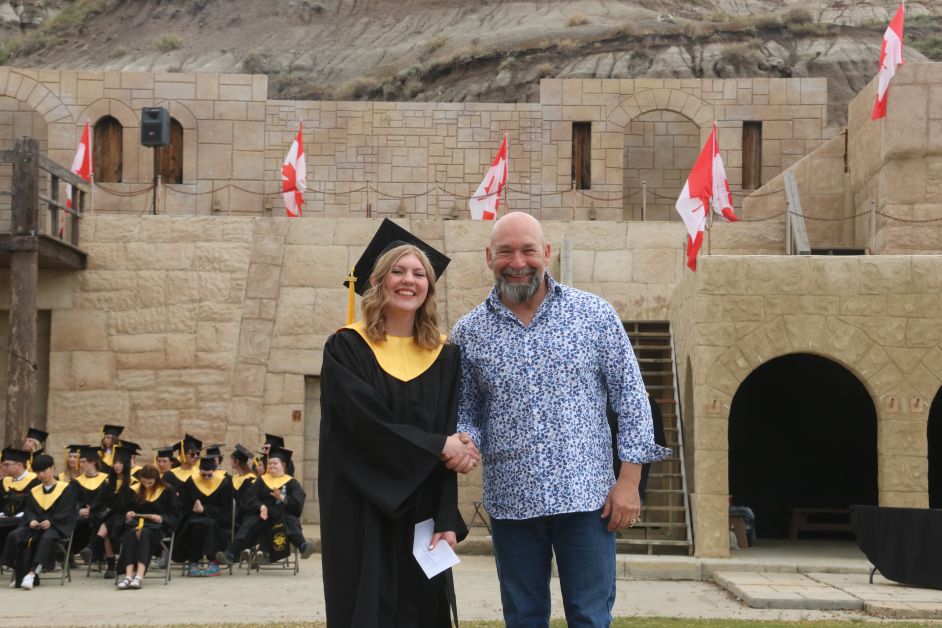 Maya Wright plans to pursue a Bachelor of Education in Elementary Studies at Mount Royal University with the goal of becoming an elementary school teacher. She received the Drama 30 Award, sponsored by Western GM Drumheller and presented by Mr. Doug Lubinski; the Alex Semaka Memorial Scholarship, presented by Christine Burfield; the Michele Salvatore Memorial Award, sponsored by Mr. Paul Salvatore and presented by Maya Bieganek; the Randolph Scholarship for Community Involvement, sponsored and presented by Dr. Amanda Randolph and Dr. Brock Randolph and the DVSS Senior Drama Award.
Maya Wright plans to pursue a Bachelor of Education in Elementary Studies at Mount Royal University with the goal of becoming an elementary school teacher. She received the Drama 30 Award, sponsored by Western GM Drumheller and presented by Mr. Doug Lubinski; the Alex Semaka Memorial Scholarship, presented by Christine Burfield; the Michele Salvatore Memorial Award, sponsored by Mr. Paul Salvatore and presented by Maya Bieganek; the Randolph Scholarship for Community Involvement, sponsored and presented by Dr. Amanda Randolph and Dr. Brock Randolph and the DVSS Senior Drama Award.
 Mischa Yanish intends to take a year off before pursuing a career in the arts. She was presented the Marie “Amy” Kuschke Memorial Scholarship Art 30, sponsored by Drumheller Associated Physicians and presented by Dr. Amanda Randolph and Dr. Brock Randolph, and the DVSS Art 30 Award.
Mischa Yanish intends to take a year off before pursuing a career in the arts. She was presented the Marie “Amy” Kuschke Memorial Scholarship Art 30, sponsored by Drumheller Associated Physicians and presented by Dr. Amanda Randolph and Dr. Brock Randolph, and the DVSS Art 30 Award.
 Rachelle Zacharuk will study Criminal Justice at Lethbridge College, with aspirations to become a detective. She received the Chiropractic Wellness Centre Award and was presented by Angie Gill.
Rachelle Zacharuk will study Criminal Justice at Lethbridge College, with aspirations to become a detective. She received the Chiropractic Wellness Centre Award and was presented by Angie Gill.
The Valedictorian Address was given by Ava Groves, Teng Jatawattana, Teagan Watson and Kael Webster the Governor General’s Award will be awarded during the opening assembly of DVSS on September 4, 2024.










































































